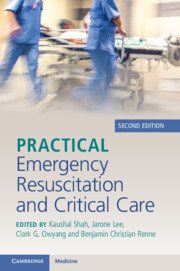Book contents
- Practical Emergency Resuscitation and Critical Care
- Practical Emergency Resuscitation and Critical Care
- Copyright page
- Contents
- Contributors
- Preface
- Section 1 General Critical Care
- Section 2 Infectious Disease Emergencies
- 5 Covid-19
- 6 Sepsis and Septic Shock
- 7 Pneumonia
- 8 Meningitis and Encephalitis
- 9 Infective Endocarditis
- 10 Necrotizing Soft Tissue Infections
- 11 Complications of Human Immunodeficiency Virus (HIV) and Acquired Immunodeficiency Syndrome (AIDS)
- Section 3 Neurological Emergencies
- Section 4 Cardiovascular Emergencies
- Section 5 Respiratory Emergencies
- Section 6 Gastrointestinal Emergencies
- Section 7 Renal Emergencies
- Section 8 Hematology–Oncology Emergencies
- Section 9 Endocrine Emergencies
- Section 10 Environmental Emergencies
- Section 11 Trauma
- Section 12 End of Life
- Index
- References
8 - Meningitis and Encephalitis
from Section 2 - Infectious Disease Emergencies
Published online by Cambridge University Press: 02 November 2023
- Practical Emergency Resuscitation and Critical Care
- Practical Emergency Resuscitation and Critical Care
- Copyright page
- Contents
- Contributors
- Preface
- Section 1 General Critical Care
- Section 2 Infectious Disease Emergencies
- 5 Covid-19
- 6 Sepsis and Septic Shock
- 7 Pneumonia
- 8 Meningitis and Encephalitis
- 9 Infective Endocarditis
- 10 Necrotizing Soft Tissue Infections
- 11 Complications of Human Immunodeficiency Virus (HIV) and Acquired Immunodeficiency Syndrome (AIDS)
- Section 3 Neurological Emergencies
- Section 4 Cardiovascular Emergencies
- Section 5 Respiratory Emergencies
- Section 6 Gastrointestinal Emergencies
- Section 7 Renal Emergencies
- Section 8 Hematology–Oncology Emergencies
- Section 9 Endocrine Emergencies
- Section 10 Environmental Emergencies
- Section 11 Trauma
- Section 12 End of Life
- Index
- References
Summary
Meningitis is inflammation of the meningeal membranes of the brain and spinal cord. Encephalitis is inflammation of the brain parenchyma with or without inflammation of the meninges. Cerebral perfusion is a function of arterial pressure and intracranial pressure (i.e., cerebral perfusion pressure = mean arterial pressure – intracranial pressure). Hypoperfusion results from cerebral edema and increased intracranial pressure (ICP). Meningitis is a life-threatening condition with up to 30% mortality and high risk of long-term neurological complications.
The differential diagnosis for meningitis and encephalitis includes subarachnoid hemorrhage, cerebral venous thrombosis, metabolic/toxic encephalopathy and other infections not involving the central nervous system (CNS).
- Type
- Chapter
- Information
- Practical Emergency Resuscitation and Critical Care , pp. 70 - 76Publisher: Cambridge University PressPrint publication year: 2023

